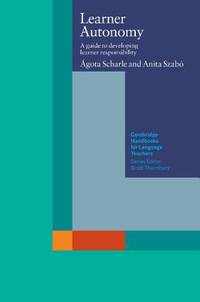Learner Autonomy
1. Autonomy in Education
1.12. Stages in Learner Autonomy Development

Scharle & Szabó(2000) describe three stages in the development of learner autonomy:
1. Raising awareness: this is where teachers usually start, however, they may notice that some students already at this stage need less guidance. Teachers will usually try to make students aware of how much influence they have on their own learning progress and how they can influence the outside factors and eliminate them. They can invite them to consider their learning habits and try out some new strategies which could suit them more.
Sample activities: questionnaires about learning preferences, attitudes, strengths and weaknesses; discussions about learning problems of famous people; discussing difficulties in learning; mind-mapping learning opportunities; experimenting with learning strategies; looking for similarities and differences, etc.
2. Changing attitudes: this will involve practising the strategies introduced in the earlier stage to generate new learning habits and help students realise how it feels when they try to handle the responsibility for their progress.
Sample activities: role-playing, monitoring the use of learning strategies; recording and analysing a short talk; analysing communication breakdown; text analysis with group support, etc.
3. Transferring roles: this stage will involve learners in the process and the procedures happening in the classroom. Learners would go deeper in their analysis, critical thinking, helping and supporting other members of the group understanding a variety of ways one can use to reach the goals.
Sample activities: allocating some tasks to the class (sharing classroom duties); simplifying instructions; sharing ideas about learning possibilities, etc.
It's important to note that these stages are not necessarily linear, and learners may move back and forth between stages depending on various factors. Additionally, the teacher's role evolves from being a central authority in the early stages to a more supportive and facilitative role as learners progress towards greater autonomy.